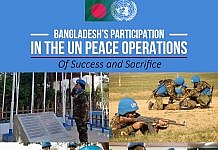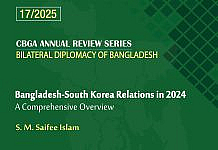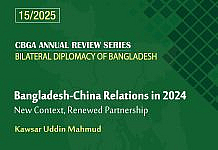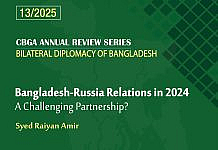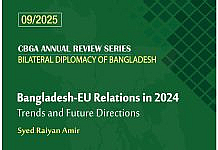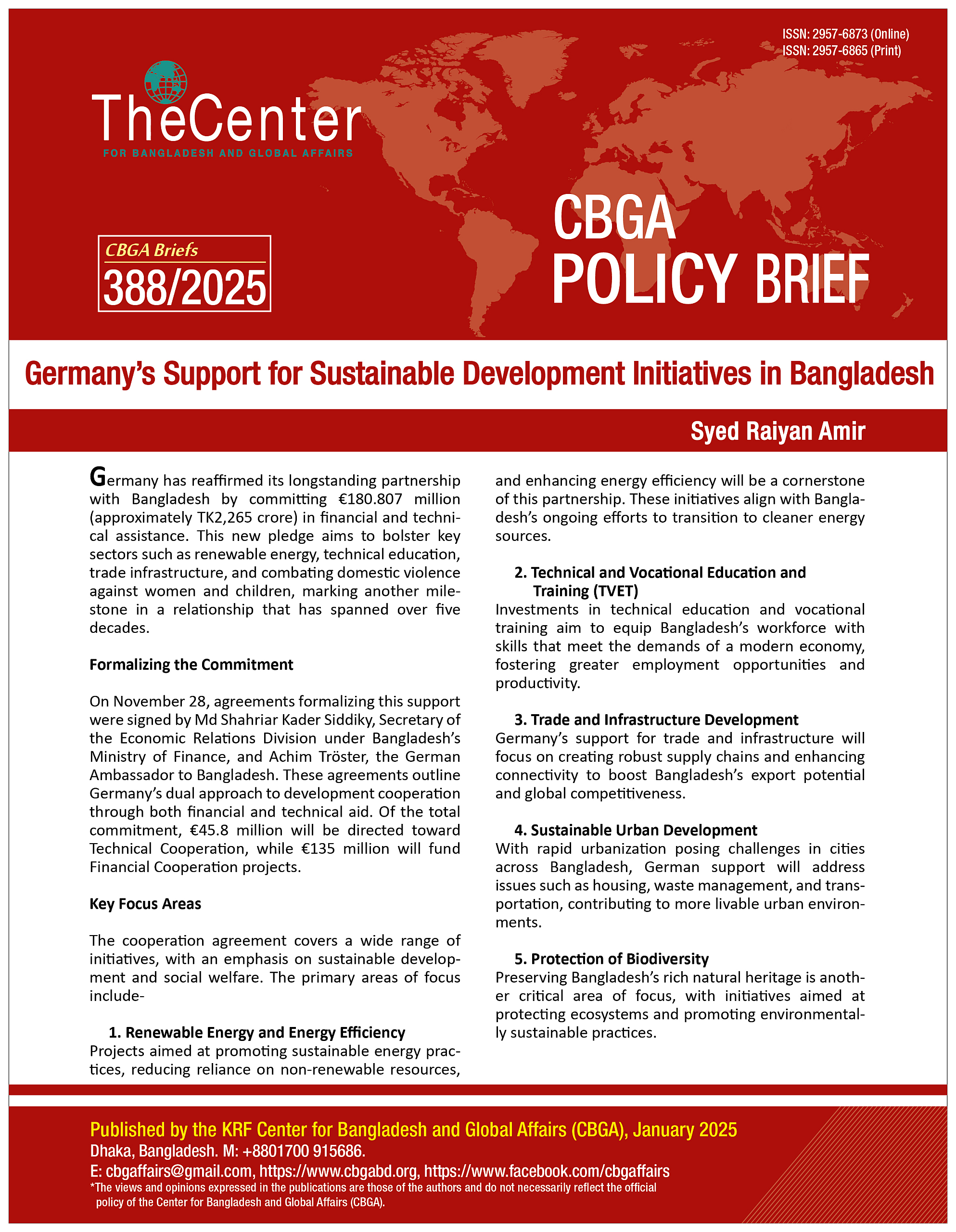
Germany has reaffirmed its longstanding partnership with Bangladesh by committing €180.807 million (approximately TK 2,265 crore) in financial and technical assistance. This new pledge aims to bolster key sectors such as renewable energy, technical education, trade infrastructure, and combating domestic violence against women and children, marking another milestone in a relationship that has spanned over five decades.
Formalizing the Commitment
On November 28, agreements formalizing this support were signed by Md Shahriar Kader Siddiky, Secretary of the Economic Relations Division under Bangladesh’s Ministry of Finance, and Achim Tröster, the German Ambassador to Bangladesh. These agreements outline Germany’s dual approach to development cooperation through both financial and technical aid. Of the total commitment, €45.8 million will be directed toward Technical Cooperation, while €135 million will fund Financial Cooperation projects.
Key Focus Areas
The cooperation agreement covers a wide range of initiatives, with an emphasis on sustainable development and social welfare. The primary areas of focus include-
- Renewable Energy and Energy Efficiency
Projects aimed at promoting sustainable energy practices, reducing reliance on non-renewable resources, and enhancing energy efficiency will be a cornerstone of this partnership. These initiatives align with Bangladesh’s ongoing efforts to transition to cleaner energy sources. - Technical and Vocational Education and Training (TVET)
Investments in technical education and vocational training aim to equip Bangladesh’s workforce with skills that meet the demands of a modern economy, fostering greater employment opportunities and productivity. - Trade and Infrastructure Development
Germany’s support for trade and infrastructure will focus on creating robust supply chains and enhancing connectivity to boost Bangladesh’s export potential and global competitiveness. - Sustainable Urban Development
With rapid urbanization posing challenges in cities across Bangladesh, German support will address issues such as housing, waste management, and transportation, contributing to more livable urban environments. - Protection of Biodiversity
Preserving Bangladesh’s rich natural heritage is another critical area of focus, with initiatives aimed at protecting ecosystems and promoting environmentally sustainable practices. - Combating Domestic Violence Against Women and Children
A dedicated project under this agreement will address domestic violence, aiming to protect vulnerable groups and promote gender equity and social justice.
A Legacy of Support
This enduring partnership reflects a shared commitment to fostering sustainable development and addressing critical socio-economic challenges.
Bangladesh has been a key partner in German Development Cooperation (GDC), one of 47 bilateral relationships maintained by Germany. Following the latest intergovernmental negotiations in May 2024, Germany pledged €180 million for bilateral development initiatives in Bangladesh. Since the inception of this partnership in the 1972, Germany has invested more than €3.5 billion in Bangladesh’s development projects. Additionally, since 2017, over €185 million has been allocated to assist Rohingya refugees and their host communities in southeastern Bangladesh.
The implementation of GDC projects in Bangladesh primarily involves state-owned agencies such as GIZ, KfW, and BGR, while the Development Cooperation Section of the German Embassy provides political guidance and ensures coordination with the Government of Bangladesh and other international partners.
Focus Areas of Cooperation
German Development Cooperation in Bangladesh centers on three bilaterally agreed core areas-
- Climate and Energy: A Just Transition
Renewable Energy and Energy Efficiency
Bangladesh’s rapid economic growth has led to a significant rise in energy demand, necessitating innovative, climate-friendly solutions. Germany supports Bangladesh’s transition to renewable energy, sharing its own experiences in moving towards sustainable energy systems. Collaborating with the European Union, Germany co-leads the Team Europe Initiative for Green Energy Transition, promoting renewable and reliable energy sources.
Sustainable Urban Development
The challenges posed by rapid urbanization and climate change—such as severe flooding, droughts, cyclones, and rising sea levels—are particularly acute in Bangladesh’s urban areas. To address these issues, GDC focuses on financing resilient infrastructure, enhancing mobility, and improving waste management systems. Emphasis is placed on low-carbon and adaptive solutions to make cities more sustainable and less vulnerable to climate-related risks.
- Sustainable Economic Development, Training, and Employment
Technical and Vocational Education and Training (TVET)
Bangladesh faces labor market challenges, including high rates of informal employment and youth unemployment. Recognizing this, GDC has introduced TVET initiatives to equip workers with skills aligned with emerging sectors like renewable energy. These programs aim to diversify Bangladesh’s economy and reduce dependence on traditional industries such as ready-made garments (RMG).
Sustainable Supply Chains and Trade Infrastructure
A significant focus is improving labor conditions and environmental standards, particularly in the RMG sector. Germany supports Bangladesh in aligning with international labor, social, and environmental standards, helping sustain export-driven growth as the country aims to graduate from Least Developed Country (LDC) status.
Germany’s Act on Corporate Due Diligence Obligations in Supply Chains complements these efforts by encouraging ethical practices across industries. Collaboration with organizations such as the Bangladesh Garment Manufacturers and Exporters Association (BGMEA) and the Bangladesh Knitwear Manufacturers and Exporters Association (BKMEA) has led to the establishment of help desks for Bangladeshi companies seeking guidance on sustainable supply chains.
- Conserving Nature and Protecting Life
Biodiversity Preservation
Germany supports Bangladesh in strengthening ecosystem-based governance and preserving its natural resources. Projects focus on expanding protected areas through the integration of digital technologies, citizen science, and youth participation, with a particular emphasis on the Sundarbans, the world’s largest mangrove forest.
Through these efforts, GDC fosters the integrated management of coastal and marine ecosystems, enhancing biodiversity conservation and promoting sustainable development in vulnerable regions like the Swatch of No Ground, a critical habitat for marine life.
Broader Impacts
Rohingya Support
Since 2017, Germany has directed over €185 million toward aiding Rohingya refugees and the host communities in southeastern Bangladesh. These funds have supported infrastructure, healthcare, education, and environmental initiatives, ensuring sustainable living conditions for affected populations.
Collaborative Framework
GDC projects are implemented through partnerships involving government agencies, civil society, academia, and private sector stakeholders. Germany also collaborates with international bodies like the International Labour Organization (ILO) to advance sustainable development goals (SDGs) and climate action objectives.
Strengthening Bilateral Ties
The latest commitment underscores the depth of the Germany-Bangladesh relationship, which has evolved into a multifaceted partnership over the decades. Germany’s consistent support reflects its recognition of Bangladesh’s potential as an emerging economy and its strategic importance in South Asia.
A Shared Vision
Germany and Bangladesh share a vision of sustainable development that prioritizes economic growth, social inclusion, and environmental protection. Through collaborative projects, the two nations aim to address pressing global challenges such as climate change, inequality, and sustainable urbanization.
Enhanced Collaboration
The agreements also pave the way for deeper collaboration between government agencies, non-governmental organizations, and private sector stakeholders in both countries. By leveraging shared expertise and resources, these partnerships are expected to yield long-term benefits for both nations.
Looking Ahead
As Bangladesh continues its journey toward becoming a middle-income country, partnerships like the one with Germany play a crucial role in achieving sustainable development goals (SDGs). The latest commitment not only strengthens existing ties but also sets the stage for innovative projects that address emerging challenges.
Broader Implications
- Economic Growth By focusing on trade, infrastructure, and technical education, the partnership is poised to drive economic growth and create employment opportunities in Bangladesh.
- Social Welfare Projects targeting domestic violence and urban development are expected to improve the quality of life for vulnerable populations and foster social equity.
- Environmental Sustainability Investments in renewable energy, biodiversity protection, and sustainable urbanization underscore a commitment to combating environmental degradation and climate change.
Conclusion
Germany’s €181 million commitment to Bangladesh reflects a strong, enduring partnership built on mutual respect and shared goals. By focusing on critical areas such as renewable energy, education, and social welfare, this cooperation promises to drive sustainable development and improve lives across Bangladesh. As the two nations continue to strengthen their ties, this partnership serves as a model of international collaboration for a more equitable and sustainable future.
– Syed Raiyan Amir is a Senior Research Associate at the KRF Center for Bangladesh and Global Affairs (CBGA).


